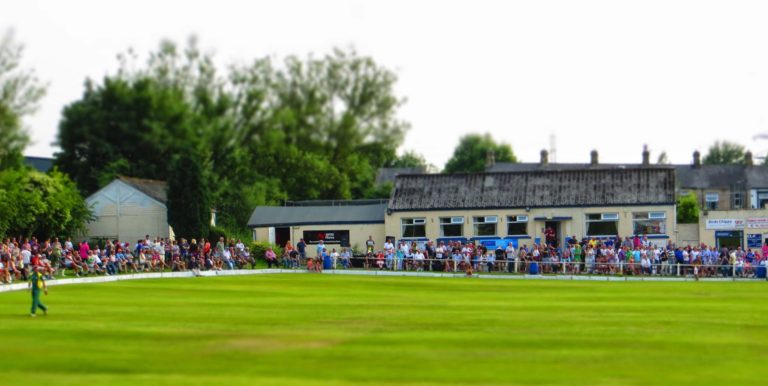1978: A trip down Lowerhouse Lane
In 1978 the Camp David Summit between Israel and Eygpt, with Jimmy Carter playing the honest broker, would lead to Nobel Peace prizes all round. It was a year when there were more technological breakthroughs. The first test-tube baby was born in ’78 and, in Japan, the Space Invaders game was invented. The home team Argentina won the World Cup. Scotland fans gloated that they had a strong team and that England hadn’t even made the trip, but ended up wanting their money back. Footballers Emile Heskey, Louis Saha and Rio Ferdinand were born in 1978. As were model Jodie Kidd, boxer Ricky Hatton and a lady making plenty of assets by using her assets, Katie Price a.k.a. Jordan. Deaths that year included Harold Abrahams of ‘Chariots of Fire’ fame; Joe Davis the snooker player; Pope Paul; Keith Moon of ‘The Who’ and boxer Gene Tunney went down for an even longer count. Ex-Haslingden pro Vinoo Mankad died. He held the record as the fastest Test player to the 100 wicket-1000 run double, until Ian Botham later beat it.
The pop charts reflected the mania caused by ‘Saturday Night Fever’ and ‘Grease’. John Travolta and Olivia Newton-John spent many weeks at the No 1 spot. 10 cc had a chart topper with ‘Dreadlock Holiday’ in which was a line on which we all agree, “we don’t like cricket, and we love it”.
In the Lancashire League of 1978 Mohinder Amarnath known as Jimmy was in the second of 4 seasons at Lowerhouse, while Allan Border was in his only year at East Lancashire C.C. ALLAN BORDER was born in Sydney in 1955. He had a storied Test career and the domination in recent history, of Australia in the cricketing world, was largely established by him. He played 156 Tests, scoring 11,174 runs at just over 50, with his dogged left-handed batting. Few players in history have been so reluctant to give their wicket away. His slow left-arm bowling was fairly ordinary but he did take 39 victims, with a remarkable best of 7-46. At the time of his retirement he had played more Tests than anyone; took part in more consecutive Tests than anyone; captained his country in more games and taken most Test catches. For all his brilliance as a player, Border will be remembered most as a strong leader, who took on the captaincy in dark days but finished in the Promised Land. His first Ashes series saw a defeat to David Gower’s England. I remember thinking at the time how uncomfortable Border looked with losing, as he had to put on a brave face in interviews with Peter West. Allan Border’s determination and force of personality soon led to a rebound in Aussie fortunes. They won the World Cup in 1987 and by 1989 the Ashes were back in safe keeping. The legacy he left Mark Taylor was far greater than when he himself had taken over. What greater compliment could Border have, than the annual prize to the Country’s top cricketer, is named ‘The Allan Border Medal’. After his international days were over, Border took great pride in helping Queensland win their first Sheffield Shield. He has at various times served as a selector for the Aussie Test squad.
‘JIMMY’ AMARNATH was born in Patiala in 1950. He was the son of an Indian Test skipper and his two brothers also played at first class level. One of those, Surinder, was Burnley pro opposite Jimmy at the ‘House, in 1977. Jimmy played 69 Tests scoring 4378 runs at over 42 with 11 centuries. He had a long span in Test cricket, beginning at Chennai in 1969 and finishing versus West Indies, in the same city in 1988. The fact that in that period he played only 69 times shows that he had a roller-coaster career. He was discarded many times, only to return from the wilderness. He had started as a player with a reputation of struggling against short-pitched bowling. Many players, such as Michael Bevan, have had Test careers blighted by this. Amarnath not only conquered the problem, he briefly got the reputation as the World’s best against pace bowling. This spell was in the 1982-83 period which was the zenith of his Test career. India played 11 consecutive away games to the mighty West Indies and hated rivals Pakistan. In those games he scored 1182 runs with 5 hundreds. His form was still on a high when he received back to back ‘Man of the Match’ awards, as India won the 1983 World Cup, with an against the odds victory versus West Indies at Lords’.
To emphasise the up and down nature of his career, he followed this with one of the worst trots in all Test history. At home, again against the Windies, he scored just one run in six innings. He was christened ‘Mr Amarnought’ and dropped yet again. He later got another chance to show that was an aberration. Since his playing days, Jimmy has had spells as coach to Bangladesh and Morocco. His involvement nowadays is limited to some T.V. commentary work. In the Lancs League of 1978, East Lancs were sixth and ‘House down in tenth. Those moderate positions didn’t reflect the individual performances of Border and Amarnath. Allan set a Club batting record with 1137 runs at 54. He also took 55 wickets at 19. Jimmy scored 826 runs at 38 and impressed as a bowler, with 80 wickets at 13. Border needed more support from the team’s amateur bowling. This was shown in a week-end in June when Border scored 104 not out versus Burnley and 179 not out against Rawtenstall. Border finished on the losing side both days! The ‘House hadn’t enough amateur talent and Amarnath had too little support. When there were runs on the board, Amarnath and Alan Holden were capable of winning any game. I can still picture his relaxed, almost lazy looking run-up, and the accuracy of his bowling, which on a helpful track led to many ‘House triumphs.







